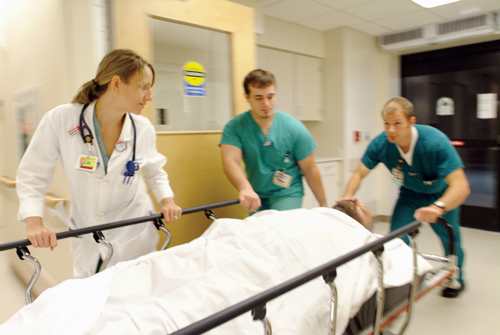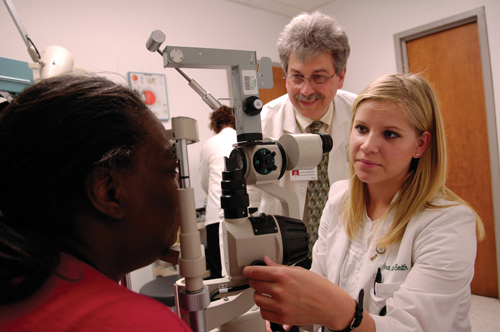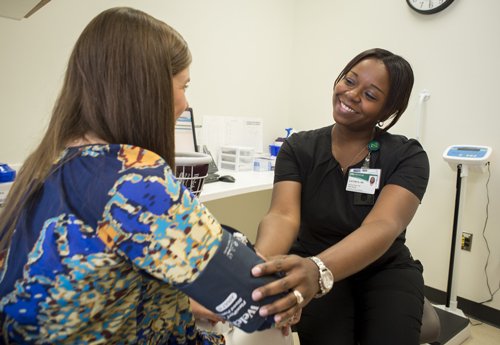Preparing for Admission to Medical School
By Dr. George S. Hand Jr., Professor Emeritus, UAB
Early Acceptance
Current high school students should be aware of the Early Medical School Acceptance Program (EMSAP). EMSAP is an undergraduate and medical school educational program that provides highly qualified students an enriched undergraduate experience in preparation for medical or dental school.
It is never too early for high school students who have an interest in a career in medicine to begin the preparation required to gain acceptance to medical school. The comments and suggestions that follow may help you gain insight into the preparations our Committee on Admissions considers advantageous. Most of the major health professions (medicine, dentistry, optometry, and osteopathy) require similar preparation; thus, these comments would be appropriate for students considering a career in any of them.
Take four years of English, mathematics and science courses (biology, chemistry and physics) in high school.
Obviously it is through the skills of language and mathematics that we communicate with one another.
Above average reading ability with solid reading comprehension is most important.
 You are encouraged to concentrate on acquiring such skills along with being able to spell correctly and write legibly. As you make preparation for such tests as the ACT, the SAT, the MCAT, and others, your reading comprehension and verbal reasoning will be exceedingly important.
You are encouraged to concentrate on acquiring such skills along with being able to spell correctly and write legibly. As you make preparation for such tests as the ACT, the SAT, the MCAT, and others, your reading comprehension and verbal reasoning will be exceedingly important.
Make certain you work to the best of your ability while in high school and college.
Do your best to be at least a B+ level student, because medical admissions committee members are looking for individuals who are high achievers. In addition to being a solid student academically, you need to participate in a reasonable number of extracurricular activities to round out your personality. Leadership skills are also highly desirable.
It is important to choose an accredited college or university that you can afford, which you will enjoy attending, which will provide you with the program of study you most desire, and which has a strong pre-professional program.
The pre-professional health careers advisor on your college campus should be knowledgeable and helpful in his/her counseling and advising.
Choose a major that is your best and favorite subject.
 It is NOT necessary for you to major in one of the sciences in order to be accepted to medical school. Consideration in choosing your major obviously should include "What will I do with my major if I am not accepted to medical school or if I decide not to go to medical school? How marketable will I be with my major if I don't go to medical school?"
It is NOT necessary for you to major in one of the sciences in order to be accepted to medical school. Consideration in choosing your major obviously should include "What will I do with my major if I am not accepted to medical school or if I decide not to go to medical school? How marketable will I be with my major if I don't go to medical school?"
Students who wait to choose a major in their sophomore year of college generally have the opportunity to study courses in several disciplines. It is possible that a more informed choice can then be made since they know from experience their relative strengths and weakness in course work and their relative likes and dislikes.
Part of your preparation for medical school includes college courses in biology, chemistry, physics, mathematics (BCPM courses), and English.
You must have "B" or better grades in the required BCPM courses to be considered competitive for medical school. If you earn grades at a B+ level in the required courses, then you may major in any subject you wish, but you obviously must do well in all of your course work.
Explore carefully the various opportunities available in the different health professions.
 One can gain familiarity with the medical profession by talking to and observing physicians and making rounds with them, by:
One can gain familiarity with the medical profession by talking to and observing physicians and making rounds with them, by:
- volunteering your services at a hospital,
- working for the Red Cross,
- visiting those individuals from your church who are sick, and
- working as a nurse's aide, an orderly, or a scrub technician, etc.
Through direct personal experience, you will gain insight into the medical profession that no amount of reading or "just thinking about it" will provide you.
Be sure to apply EARLY and meet all required deadlines.
This is important as you apply for admission to college, but it is even more important when you make application for admission to Medical, Dental, or Optometry school. You should keep in close personal touch with the health professions advisor on your college campus as he or she will advise you concerning the application process and deadlines to meet. Your advisor will also be able to put you in touch with those individuals who are the admissions officials at the various professional schools.